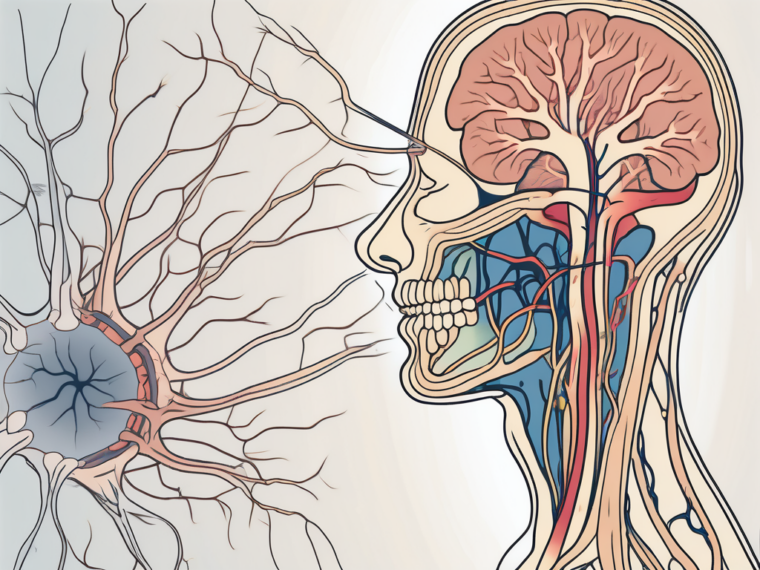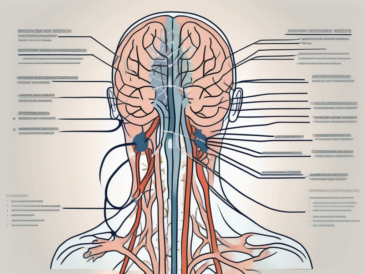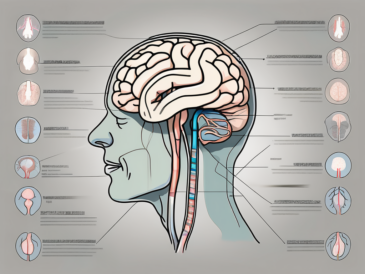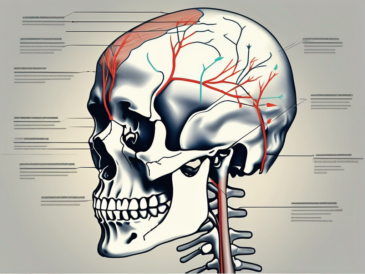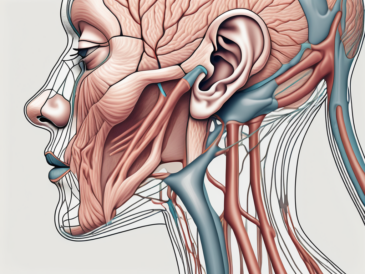The glossopharyngeal nerve is an important cranial nerve that plays a crucial role in various vital functions of the body. When this nerve is damaged, it can lead to a wide range of symptoms and complications. Understanding the anatomy, functions, causes of damage, symptoms, diagnosis, treatment options, prognosis, and prevention of glossopharyngeal nerve damage is essential to provide appropriate care and support to individuals experiencing this condition.
Understanding the Glossopharyngeal Nerve
The glossopharyngeal nerve is the ninth cranial nerve and is responsible for carrying sensory and motor information from the throat, tongue, and other structures in the head and neck to the brain. It is composed of both motor and sensory fibers, making it a mixed nerve.
The glossopharyngeal nerve, also known as cranial nerve IX, is a vital component of the human nervous system. It plays a crucial role in various functions, including taste perception, swallowing, and cardiovascular regulation.
Anatomy of the Glossopharyngeal Nerve
The glossopharyngeal nerve originates in the medulla oblongata, the lower part of the brainstem. It exits the skull through the jugular foramen, a small opening located at the base of the skull. From there, it branches out to innervate various structures in the oropharynx, including the tongue, tonsils, and pharynx.
The intricate network of nerve fibers within the glossopharyngeal nerve allows for efficient communication between the brain and the oropharynx. These fibers are responsible for transmitting signals related to both motor and sensory functions.
The motor fibers of the glossopharyngeal nerve control the muscles involved in swallowing and speech production. These muscles work in harmony to ensure the smooth passage of food and the production of clear speech sounds. Without the proper functioning of the glossopharyngeal nerve, these essential actions would be compromised.
On the other hand, the sensory fibers of the glossopharyngeal nerve provide information about taste, touch, and pain sensations from the tongue, pharynx, and other regions of the oropharynx. These sensory signals are crucial for our ability to appreciate different flavors, detect potential dangers, and maintain overall oral health.
Functions of the Glossopharyngeal Nerve
The glossopharyngeal nerve has several essential functions. One of its primary roles is in the sense of taste, facilitating the perception of flavors from the back of the tongue. This ability to taste different flavors is not only enjoyable but also crucial for our overall nutrition and well-being.
In addition to its involvement in taste perception, the glossopharyngeal nerve contributes significantly to the swallowing process. It coordinates the movement of muscles involved in swallowing, allowing safe passage of food and liquids from the mouth to the esophagus. Without the proper functioning of the glossopharyngeal nerve, swallowing would become a challenging and potentially dangerous task.
Furthermore, the glossopharyngeal nerve plays a vital role in regulating blood pressure and heart rate. It carries sensory information from the carotid sinus, a specialized area in the carotid artery, to the brain. This information allows for the appropriate adjustments in cardiovascular responses, ensuring that our blood pressure and heart rate remain within a healthy range.
Overall, the glossopharyngeal nerve is a remarkable structure that enables us to enjoy the taste of food, swallow safely, and maintain cardiovascular homeostasis. Its intricate anatomy and multifaceted functions make it an essential component of our daily lives, often working behind the scenes to ensure our well-being.
Causes of Glossopharyngeal Nerve Damage
Glossopharyngeal nerve damage can occur due to various causes. Understanding these causes is important in determining the appropriate management and treatment options. The primary causes of glossopharyngeal nerve damage include trauma and injury, medical conditions and diseases, and surgical complications.
Trauma and Injury
Physical trauma or injury to the head, neck, or throat region can result in glossopharyngeal nerve damage. This damage may occur due to accidents, falls, or sports-related injuries. For example, a fall from a bicycle can cause a sudden impact to the head and neck, potentially leading to nerve damage. It is important to seek immediate medical attention if any significant injury to these areas is sustained to evaluate for potential nerve damage.
In some cases, even seemingly minor incidents can result in glossopharyngeal nerve damage. For instance, a person may accidentally bite down on a hard object while eating, causing trauma to the tongue and potentially affecting the nearby glossopharyngeal nerve. Therefore, it is crucial to be cautious and aware of potential risks to prevent unnecessary injury.
Medical Conditions and Diseases
Several medical conditions and diseases can lead to glossopharyngeal nerve damage. These may include tumors, infections, inflammation, or compression of the nerve due to structural abnormalities or growths. For example, a tumor in the throat region can exert pressure on the glossopharyngeal nerve, interfering with its normal function.
Furthermore, certain systemic conditions such as diabetes or autoimmune diseases can also affect the function of the glossopharyngeal nerve. In diabetes, high blood sugar levels can cause nerve damage throughout the body, including the glossopharyngeal nerve. Autoimmune diseases, on the other hand, can trigger an immune response that mistakenly attacks the nerves, leading to damage.
It is important to consult with a healthcare professional if persistent or unexplained symptoms related to the throat, tongue, or swallowing emerge, as these may indicate an underlying medical condition requiring further evaluation and care. Early detection and treatment of these conditions can help prevent or minimize glossopharyngeal nerve damage.
Surgical Complications
During surgical procedures involving the head, neck, or throat, the glossopharyngeal nerve may be inadvertently damaged. Surgeons take utmost care to preserve the integrity of this nerve during such procedures. However, in some cases, unforeseen complications may occur, leading to nerve injury.
For instance, during a surgery to remove a tumor in the throat, the proximity of the glossopharyngeal nerve to the tumor can make it vulnerable to damage. Surgeons must navigate this delicate area with precision to avoid any harm to the nerve. Prior to undergoing any surgical intervention, individuals should have a thorough discussion with their surgeons to assess the potential risks and benefits.
In some cases, surgical complications may not become apparent immediately after the procedure. The nerve damage may manifest gradually over time, leading to symptoms such as difficulty swallowing or changes in taste sensation. Regular follow-up appointments with the healthcare team are essential to monitor for any signs of nerve damage and address them promptly.
In conclusion, glossopharyngeal nerve damage can occur due to trauma and injury, medical conditions and diseases, and surgical complications. Understanding the causes and potential risks associated with glossopharyngeal nerve damage is crucial in order to prevent, diagnose, and manage this condition effectively.
Symptoms of Glossopharyngeal Nerve Damage
The glossopharyngeal nerve is a crucial component of the cranial nerves, responsible for various functions related to swallowing, speech, and sensory perception in the oropharyngeal region. When this nerve sustains damage, it can lead to a range of symptoms that significantly impact an individual’s daily life.
Physical Symptoms
One of the primary physical symptoms of glossopharyngeal nerve damage is weakness or paralysis of the muscles involved in swallowing and speech production. This can result in a myriad of challenges, such as difficulty in initiating the swallowing process, leading to a sensation of food getting stuck in the throat. Individuals may also experience hoarseness, loss of voice, or changes in speech patterns, making communication a daunting task.
In addition to these difficulties, glossopharyngeal nerve damage can cause pain or discomfort in the throat region. This discomfort can range from a mild irritation to a sharp, persistent pain, making it uncomfortable to eat, drink, or even speak.
Sensory Symptoms
The glossopharyngeal nerve also carries sensory fibers responsible for transmitting information from the back of the throat, tongue, and other oropharyngeal structures to the brain. When these sensory fibers are damaged, individuals may experience altered sensations in these areas.
One common sensory symptom is a decreased sense of taste, known as hypogeusia. This can lead to a diminished enjoyment of food and beverages, as flavors become less pronounced or even undetectable. Additionally, individuals may experience numbness or tingling sensations in the affected areas, causing a loss of sensitivity and potentially affecting the ability to detect temperature or texture changes in food.
Speech and Swallowing Difficulties
The glossopharyngeal nerve plays a critical role in coordinating the muscles involved in the swallowing process and speech production. When damage occurs, it can result in significant difficulties in both of these areas.
Swallowing difficulties, also known as dysphagia, can manifest as choking or aspiration of food or liquids. This can be a distressing experience, as it poses a risk of food entering the airway and potentially causing respiratory problems. Individuals may find themselves having to modify their diet or rely on alternative feeding methods to ensure their nutritional needs are met safely.
Speech may also be affected by glossopharyngeal nerve damage. Changes in speech patterns, voice quality, or reduced articulation can make communication challenging and frustrating. Individuals may struggle to be understood or find that their voice becomes weak or strained, impacting their ability to engage in conversations or express themselves effectively.
If you are experiencing persistent difficulties with swallowing or speech, it is crucial to consult with a healthcare professional for further evaluation and appropriate management options. They can provide a comprehensive assessment, identify the underlying cause of the glossopharyngeal nerve damage, and develop a tailored treatment plan to address your specific needs.
Diagnosis of Glossopharyngeal Nerve Damage
The diagnosis of glossopharyngeal nerve damage involves a comprehensive evaluation of the medical history, physical examination, as well as imaging and laboratory tests to establish the underlying cause and extent of the nerve injury.
Medical History and Physical Examination
During the medical history assessment, the healthcare provider will inquire about the presenting symptoms, previous medical conditions, and any recent injuries or surgeries that may contribute to the nerve damage. A thorough physical examination will be conducted to evaluate the motor and sensory functions of the glossopharyngeal nerve, including assessments of swallowing, voice quality, taste perception, and throat sensation.
In the medical history assessment, the healthcare provider will delve into the details of the patient’s symptoms. They will ask about the duration and frequency of symptoms such as difficulty swallowing, changes in voice quality, altered taste perception, and abnormal throat sensation. The provider will also inquire about any other associated symptoms, such as pain, numbness, or tingling in the throat or tongue. This information will help in determining the possible underlying cause of the glossopharyngeal nerve damage.
During the physical examination, the healthcare provider will carefully observe the patient’s swallowing function. They may ask the patient to swallow different substances, such as water or a contrast material, while monitoring the movement of the throat muscles. The provider will also assess the patient’s voice quality by asking them to speak and listen for any abnormalities in pitch, volume, or clarity. Taste perception will be evaluated by testing the patient’s ability to recognize different flavors. Additionally, the provider will perform a thorough examination of the throat, using specialized instruments if necessary, to assess the sensation and detect any abnormalities.
Imaging and Laboratory Tests
Imaging studies, such as magnetic resonance imaging (MRI) or computed tomography (CT) scans, may be recommended to visualize the structures of the head, neck, and throat and identify any potential anatomical abnormalities or lesions. These imaging techniques provide detailed images of the nerves, blood vessels, and surrounding tissues, allowing the healthcare provider to assess the extent of the nerve damage and identify any potential causes, such as tumors or structural abnormalities.
Laboratory tests may also be conducted to investigate for any underlying systemic conditions or infections contributing to the nerve damage. Blood work may be performed to assess the levels of certain markers or to check for signs of inflammation or infection. Cultures may be taken from the throat or other relevant areas to identify any specific pathogens that may be causing the nerve damage.
It is important to note that the diagnostic process should be conducted by qualified medical professionals. Self-diagnosis and self-treatment are not recommended and can lead to potential complications or delays in appropriate care.
In conclusion, the diagnosis of glossopharyngeal nerve damage involves a comprehensive evaluation that includes a detailed medical history assessment, thorough physical examination, and the use of imaging and laboratory tests. These diagnostic tools help healthcare providers determine the underlying cause and extent of the nerve injury, leading to appropriate treatment and management strategies.
Treatment Options for Glossopharyngeal Nerve Damage
The treatment options for glossopharyngeal nerve damage depend on the underlying cause and severity of the injury. The primary goals of treatment are to alleviate symptoms, improve function, and address the specific contributing factors.
Medications and Therapies
Depending on the nature of the symptoms and underlying condition, healthcare professionals may recommend medications to manage pain, reduce inflammation, or address any associated medical conditions or infections. Rehabilitation therapies, such as swallowing therapy or speech therapy, may also be beneficial in improving swallowing and speech functions.
It is important to follow the recommendations and guidance provided by healthcare professionals when considering medication or therapy options. Self-medication or self-prescription should be avoided.
Surgical Interventions
In cases where the glossopharyngeal nerve damage is due to compressive lesions or surgical complications, surgical interventions may be considered. Surgeons with expertise in head, neck, or throat surgery may perform procedures to remove tumors, relieve compressive structures, or repair damaged nerves. The decision to undergo surgery should be thoroughly discussed with healthcare professionals to assess the risks and benefits.
Prognosis and Recovery from Glossopharyngeal Nerve Damage
The prognosis and recovery from glossopharyngeal nerve damage vary depending on the underlying cause, extent of the injury, and individual factors. In some cases, with appropriate treatment and rehabilitation, partial or complete recovery of nerve function can be achieved.
Factors Influencing Recovery
Several factors can influence the recovery process, including the extent of nerve damage, underlying medical conditions, age, overall health, and adherence to treatment recommendations. It is essential to maintain open communication with healthcare professionals and actively participate in the prescribed management plan.
Coping and Living with Glossopharyngeal Nerve Damage
Living with glossopharyngeal nerve damage can present challenges in daily life. Individuals may need to make modifications to their diet, swallowing techniques, or speech patterns to accommodate for the changes in function. It is important to seek support from healthcare professionals, such as speech therapists or nutritionists, who can provide guidance on managing these challenges effectively.
Prevention of Glossopharyngeal Nerve Damage
Preventing glossopharyngeal nerve damage involves adopting healthy lifestyle practices and seeking timely medical care for any concerning symptoms or injuries.
Lifestyle Modifications
Maintaining a healthy lifestyle, including regular exercise, balanced diet, and avoidance of harmful habits such as smoking or excessive alcohol consumption, can improve overall health and reduce the risk of developing conditions that could lead to nerve damage. Additionally, practicing caution and utilizing protective measures during sports or activities with a risk of head or neck injuries is crucial in preventing trauma-related nerve damage.
Regular Check-ups and Early Detection
Regular check-ups with healthcare professionals can aid in early detection and management of medical conditions that may contribute to glossopharyngeal nerve damage. Seeking prompt medical attention for any concerning symptoms or injuries is important to prevent potential complications and enable timely interventions.
It is important to note that the information provided in this article is for educational purposes only and should not be considered as medical advice. Individuals experiencing symptoms or concerns related to glossopharyngeal nerve damage should consult with qualified healthcare professionals for accurate diagnosis and appropriate management options.
